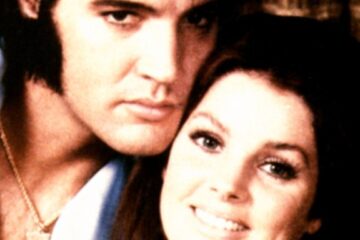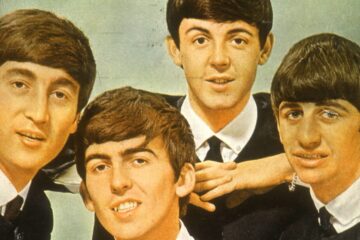Last month, a headline in The New York Times Magazine posed the not-quite-rhetorical-enough question, “Is Måneskin the Last Rock Band?” That these kohl-eyed Italian Fraggles, with their assiduously bared clavicles and codpiece riffs, might represent the extinction event of one of the 20th century’s greatest inventions seemed comical and at best misguided. To a flurry of indignant commenters, it was mostly just outrageous. Måneskin is great! Or: Måneskin sucks, but have you not heard Idles, Scowl, Fontaines D.C.?
At this point, the rock-is-dead conversation has become an internet ouroboros, inexhaustible and broadly unwinnable. But if the genre is not technically deceased in 2023, it does seem to have entered a sort of terminal gloaming. What’s new is retro; what’s old is, for the most part, well-commodified nostalgia. U2 is in residence at the Sphere in Las Vegas, howling redemption anthems into a pixelated dome, while Foo Fighters run laps on SNL; Nirvana merch is apparently now Abercrombie for preppy tweens.
It’s into this world that the current lineup of the Rolling Stones is, at the combined age of 301, releasing their first album of original material in 18 years. Hackney Diamonds also happens to be the first since the death of Charlie Watts, the drummer whose crisp jazzbo elegance and unflappable cool literally kept the tempo for nearly six decades. (Steve Jordan, his anointed successor, has now stepped in, though some of Watts’s final sessions still appear here.)
So perhaps it is the best possible thing that the bulk of Diamonds came together in what Keith Richards calls a “blitzkrieg,” after years of fruitless sessions and false starts — the songs nearly all recorded in a monthslong rush and locked after four or five takes. Thirty-two-year-old producer Andrew Watt regularly sculpts young-millennial hits for Justin Bieber, Cardi B, and Dua Lipa, but he has also freshened up the late-career output of Iggy Pop and Ozzy Osbourne, and here he seems to have created the kind of controlled studio setting that allows the band to be loose or at least sound that way.
Album opener “Angry” is a hard strut, a maybe-breakup anthem forged from jabbing guitar lines, metronome drums, and a howling Mick refrain. The low-key horny “Get Close” positions Jagger as a man still supremely confident in his draw on the female sex; by the next track, the rueful, stripped-back ballad “Depending on You,” he’s less sure: “I invented the game but I lost like a fool / Now I’m too young for dying and too old to lose.” (The laws of fertility say otherwise; his eighth child, Deveraux Octavian Basil Jagger, was born in 2016.)
When friends show up they are, unsurprisingly, a Grammy Museum in guest form: Paul McCartney goes back to teenage-garage-band bass on the rowdy and casually profane “Bite My Head Off”; Elton John bangs out a whole honky-tonk piano run (alongside retired Stones bassist Bill Wyman, and some of Watts’s last drum work) on “Live by the Sword,” a gleefully bratty stream of bumper-sticker directives. (“If you wanna get rich better sit on the board / If you wanna be poor better pay the landlord.” Well… yes? That’s generally how rent works.)
Lady Gaga happily runs away with the expansive, gospel-hued stomper “Sweet Sounds of Heaven,” channeling peak “Shallow”-era Ally Maine while Stevie Wonder’s keyboards flutter tastefully beneath her rasping wail. At 80, Jagger’s voice can still compete; he sounds remarkably Mick-ish and undiminished throughout, to the point that there may be a portrait of his larynx in an attic somewhere. The same can’t really be said for Richards, who takes lead vocals on the weary, wary “Tell Me Straight,” though its raggedness serves him, bringing a warm patina of worn vulnerability to searching lines like “Is my future all in the past?”
That is, of course, the salient question, one that even the cheerful cosplay karaoke of bands like Måneskin can’t really answer. The video for Diamonds’ lead single, “Angry,” features Euphoria actress Sydney Sweeney as a sort of Barbarella sex kitten in star-mapped leather chaps, slithering across the seats of a candy-apple convertible on Sunset Boulevard while billboards of younger Stones gone by — shaggy, vibrant, dangerous — animate and come to life. It’s both a canny callback and a vaguely depressing summation: Remember these guys? Of course you do; they invented all this, more or less.
The album almost can’t help but conjure ghosts like that on every track, the Hackney machine haunted by the group’s towering history (a melody that echoes “Moonlight Mile” here; a soupçon of “Start Me Up” there). But to dismiss it out of hand as some kind of Pet Sematary approximation of former glories, a polished, cynical monument to corporate dad rock, feels churlish, if not entirely inaccurate: The Stones today are of course millionaires many times over, as much a red-tongued symbol and an LLC as they are a band. And when you’re an octogenarian, your future is, barring some bio-hacked miracle, mostly in the rearview.
Jordan, a relative kid at 66, is a consummate pro on the drum kit, but it also seems cruel to expect him to replicate the bebop signatures and style of Watts; so much of the alchemy of a band is in the mysterious ways they mesh on and offstage. In that regard, at least, the three surviving core members and Watt, their producer, seem wise to have chosen a more organic, hand-crafted route throughout — one that leans heavily on the yin-yang of Jagger’s emotional expressiveness and Richards’s inscrutable pirate cool. Guests come and go, but the Glimmer Twins know where their sweet spots are: In Keef’s lean, louche guitar lines and Mick’s spiraling croon, stretching every vowel it can like taffy.
A new Stones record in this year of our Lord 2023 may feel as necessary as an appendix or a milkman. If the last half-century-plus has yielded any wisdom, though, it’s that it’s easy enough to have sympathy for the devil; less so the vagaries of aging in a pop-culture landscape designed in almost every way to elevate youth and turn away from evanescence, even as it relentlessly tweaks and fetishizes the past. Diamonds ends, fittingly, not with a bang but a wistful, faithful cover of Muddy Waters’ 1950 touchstone “Rollin’ Stone,” itself a reworking of a Delta blues number that dates back to the 1920s. From that rumbling wellspring the group (or at least their name) famously came, and to it they’ve returned: altered and abraded by time, maybe, but not finished trying to touch something divine.




